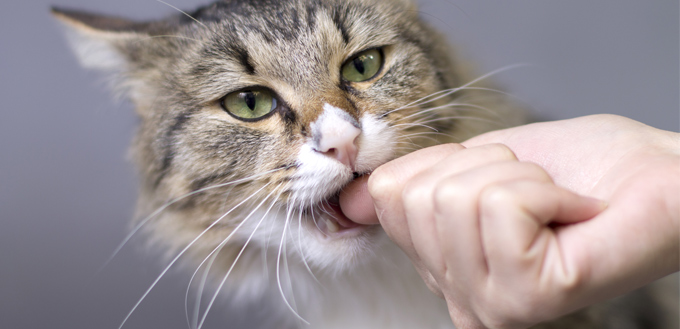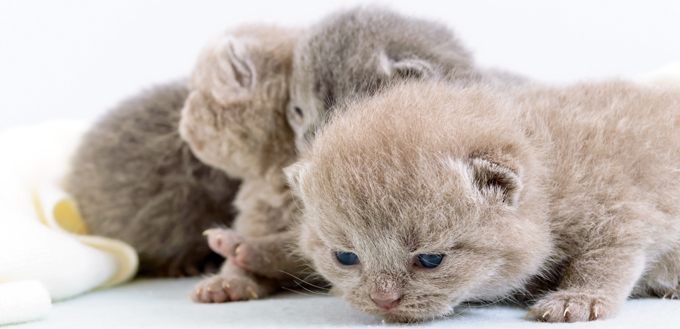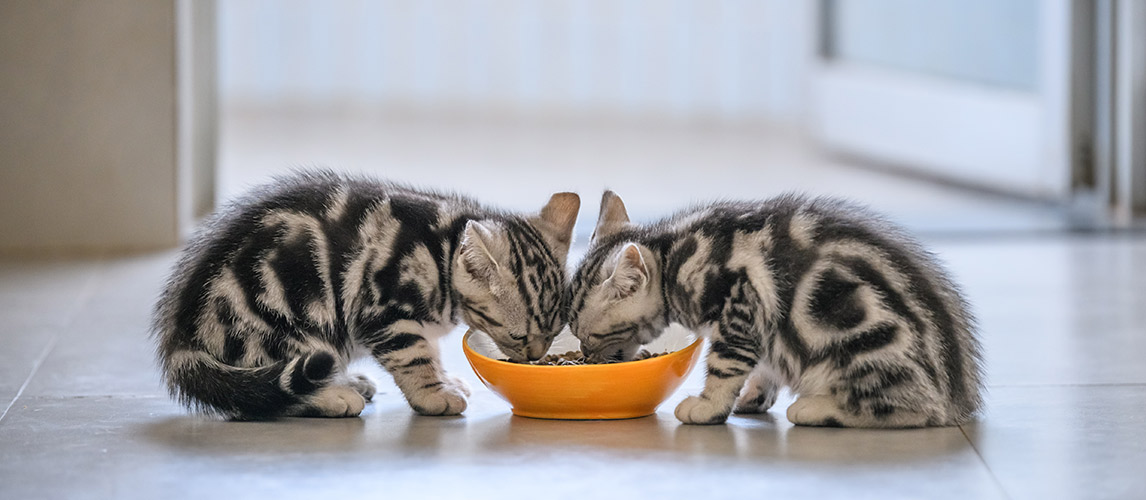Having pets is a blessing. It is almost the same as taking care of your own child. It gives you happiness, some unspeakable precious moments but it also comes with a lot of responsibility. Just like a child, you have to nurture your pets and train them about various behavioral patterns. With pets, the main challenge is to communicate the feelings and instructions through non-verbal cues. As cat or kitten owners, we have come across a myriad of questions and problems they face while rearing them. The reasons are that the cats’ behavioral traits are quite different from other animals. Some are actually natural behavior where there is nothing to worry about whereas others might be a matter of great concern.

In this article, we talk about one of the most common problems cat owners face, the problem of kitten suckling and nursing behavior. There are two major problems related with these. The first one is the lack of awareness and proper knowledge among the owners. The second problem is the fact that owners deal with the situation in a way that they are actually not supposed to. As a cat owner, we would highly recommend that you be patient with your cat and properly understand the issues of suckling and nursing behavior.
Difference Between Suckling and Nursing
Although both the terms might be used interchangeably in various platforms, there is a distinctive difference between the two.
What is Suckling?
Suckling refers to the continuous suckling of objects. The objects could be fur, clothing, blanket, wool, own self, other kittens or any other toy. This behavior is considered normal when the kitten does that within the five to six weeks when it is born. The matter of concern rises when even in the adult stage, your cat resorts to such behavior.
What is Nursing Behavior?
When the kitten initially develops to react to the new surroundings, it resorts to the owner for its comfort. Suckling on to the owner, their foot, hands or other body parts is part of nursing behavior. It is highly recommended that you go with the flow as long as your cat is in the kitten stage.
Common Traits of Unhealthy Suckling or Nursing Behaviour
Suckling or nursing behavior as explained before is part of the natural growing process of the kitten. The problem arises when the cat cannot opt out of this activity.
- Compulsive behavior
The first and foremost aspect to identify if something is wrong is when you see that your cat is adopting a compulsive behavioral pattern. It is continuously suckling on to something and reacts in a negative way when you try to stop that. This sort of addictive behavior is harmful for the cat and steps need to be taken to tackle this problem. From your part, it will take patience and continuous positive re-enforcement for habit changes and new habit building.
- Out of the ordinary activity
Our research says that there are plenty of activities that owners get concerned about which might be just part of the growing process. For instance, we found owners getting concerned when two of their cats lick each other. But kitten trying to nurse on other cat is a completely natural activity performed by the cats. There are instances when the cat sucks on itself for a long period of time. This is also part of the natural process.
You will also find moments when your kitten sucks your hands or foot as a source of affection. All of these seem normal up to a certain extent. But problems arise when things get out of the normal scenario.

Reasons Why Suckling Behaviour Occurs
There are various reasons why your cat would resort to suckling. Here we will be discussing the key reasons why the suckling actually persists among the cats.
- Stress and boredom
Stress and anxiety are some of the major reasons why cats resort to suckling. This stress or anxiety could be for any reason. It could be because of the fact that the owner does not spend much time with the cat or the loss of a close family member. To deal with the anxiety and stress situation, cats resort to suckling as part of their coping mechanism. Other than ordinary suckling, stress also induces some other behavioral patterns among cats such as over-grooming behaviors, flank-licking, paw-sucking and tail chewing. Boredom also leads to suckling behavior. When the cat has nothing to do, it finds the easiest way to pass time is to knead with a wool or blanket.
You May Also Like: Why Do Cats Suck on Blankets?
- Taken apart from mother
Recent studies show that a kitten is supposed to stay with its mother for at least twelve weeks. If the kitten is taken away from the mother before that period of time, the probability of suckling increases to the peak. The kittens then find an inherent need to suck onto something warm, soft or comforting that can replace its mother. Basically, any object that has the slightest resemblance of its mother might be the target of suckling. Initially, it is fine for the kittens to go for alternative comforting materials in absence of the mother. However, the behavior needs to be discouraged after a period of time when your cat starts to grow.
- Skin issues
When the cat is licking a specific part of the body all the time, chances are that the cat is suffering from a skin disease. When a certain part of the skin is hampered, cats end up licking that region constantly to provide comfort in that place. You can identify whether the cat is licking for a skin problem or some other reasons from the noise it makes. That is, if your cat is making purring or comforting noises, the cat is probably not infected with skin problems. But if your cat makes loud shrieks, this means that there is something wrong with the specific part of that body where the cat is licking.
- Hereditary behavior
Sometimes the persistent suckling or nursing behavior is due to genetics. Now this is completely based on abstract research. Usually, we find European or North American breeds of cats not possessing the suckling or nursing behavior. But it is seen that the situation is more prevalent among the Siamese, Balinese, Tonkinese breeds and even their crosses. Basically, the probability of oriental breeds suffering from this problem is higher compared to European or North American breeds.
When to Worry?
As mentioned before, sometimes it is completely natural for a kitten or cat to do suckling, kneading or nursing behavior. But there are times when it should become a matter of concern for you. As cat owners, the responsibility falls under you to keep track of your cat’s behavior and take appropriate actions when things go wrong. Here are some of the situations when you should become worried.
- Natural behavior VS unnatural behavior
When the kitten is licking itself and making purr noises, that is part of natural behavior. But you need to start worrying when she specifically licks one region of the body and makes really loud noises while doing so. This implies that she is suffering from pain in that particular region and licking is just a source of comfort. Kitten trying to nurse on other cat is a completely normal activity. In this case, you have nothing to worry about.
When the kitten is licking a certain person, which means it is trying to show affection to that person or the kitten is extremely comfortable with that person’s company. Now if you don’t like the licking, you can opt for habit building for your kitten. However, when the kitten’s suckling is converted to biting, that is a problem that requires immediate attention.
- Intake of fabrics
Kneading of wool or suckling clothing is a cute activity to see among kittens. The concern rises if your kitten is obsessed with the fabric. This repetitive action finally leads to chewing the fabric and taking them inside the body. That can, of course, lead to infections and other diseases.
- Involvement of claws
Whenever there is an involvement of claws along with suckling, it’s a strict no! Specifically when the suckling is involved with a human. We understand that with cats, you will end up getting few scratches anyway. But turning this into a habit is not encouraged at all.

What Should You Do?
Now that you know what the specific problems associated with suckling and nursing behavior are, it’s time to understand what actions you can take to stop the compulsive behavior of your kittens or cats.
- Subtle gestures of less affection
When your cat is obsessed with suckling you, from your end you have to be a little strict. By that we don’t mean scolding the cat or punishing it. Simply take the cat away from you when it resorts to such behavior. When you perform the same activity every time the cat resorts to suckling, it will start to associate suckling as an activity that drives it away from you. However, with this process you will have to be a little patient.
- Bitter-apple treatment
If your cat is highly attached to a certain piece of clothing or fabric, simply rub bitter apple to the clothing. Cats hate the smell of bitter apple and will eventually move away from the clothing. This is a simple act of classical conditioning. After continuous smell of bitter apple from the fabric, the cat will start associating bad smell with that fabric and will eventually stop sucking the clothing.
- Use distraction
The ideal situation to tackle suckling or nursing behavior is to provide a form of distraction to the kittens or cats. Whenever it is suckling, simply call the cat and divert its attention towards a specific kitten toy or object. You can use a cat pacifier for instance. This method might not work for those cats whose attention spans are higher.
- More fiber in diet
One of the reasons kittens or cats ingests fabric or clothing is because they do not feel full after a meal. To compensate for that, cats go for suckling clothes, wools and fabrics. What you can do is, incorporate more fiber in your pet’s diet. Fiber will keep your kitten healthy as well as keep the stomach full for a longer period of time.
- Keep a happy place
You can create a designated place for your kitchen. The place can be something soft and comfortable for the kitten to simply lie down and relax. This method is a good way to keep your kittens happy and stress free. Make sure you put a cat pacifier in the place.
- Medication
Our final recommendation would be to go for medication in order to stop suckling or nursing behavior. However, this is the most radical step to take. We would advise you to use the techniques mentioned before and if those do not work out, only then you should opt for medication. We would still discourage this option and keep trying to change your kitten’s habit in a natural way.
What Should You Avoid?
When it comes to changing the behavior of cats, there are a few things that you should avoid. Otherwise, you will not actually get the desired results. For instance, do not scold your kitten or cat for suckling or nursing behavior. That is because, most of the time they resort to such behavior to find comfort from a problem (absence of a mother, dealing with a new neighborhood, etc.). Punishing for suckling or nursing behavior is also highly discouraged. That is again for the same reason; punishing will not solve the problem.
Conclusion
The final tip from us would be to spend more time with your kitten or cat, play with them and provide them with a comfortable zone to relax. In this way, they will get less bored and be less stressful about any changes that occur around them. Simply sitting or lying down in the designated comfort zone will act as a substitute for suckling.
Sources:
- Ken Lambrecht, DVM, Is Your Cat Suckling as an Adult?, PetMD
- Pippa Elliott, MRCVS, How to Manage Wool Sucking in Cats, WikiHow






My 5 month old kitten is nursing on her five month old sister kitten. Why would she do that?
When is the best time to add to the milk for the kitten menu ?
She’s a beautiful kitten . In fact she looks just like advertisement, that is with the dog. So when is the time to give your kitten cat food ? What’s the best food for her, or him ?
Some good guidance in your article I will put to good use for my long term plans.
Thank you for spending some time to publish this, I’m sure it
can help numerous others as it has helped me personally.